
What do the people at Shortform read? What are our favorite nonfiction books—and why?
Shortform Reads is an article series in which we interview our team members and share their views on reading. We’ve plucked out the nonfiction titles that are most popular among our team, and we’re sharing what people appreciate most about these books.
Atomic Habits
How can you change your life? In Atomic Habits, James Clear argues that the key lies in your habits: the automatic behaviors that make up more than half of what you do every day. Clear contends that implementing the right habits will drastically improve your life—but to do so, you must understand how habits work and how to change yours.
TITLE: Atomic Habits
AUTHOR: James Clear
TIME: 54
READS: 1490.5
IMG_URL: https://www.shortform.com/blog/wp-content/uploads/2020/11/atomic-habits-cover.png
BOOK_SUMMARYURL: atomic-habits-summary-james-clear
AMZN_ID: XYZ
Why It’s a Favorite
What Edel says:
This book was an immense help, prompting me to change my daily routine and break bad habits. I started to be more aware of my environment and arrange it in a way that will help me be more productive. I made my desk clean and clutter-free, and I stopped working on my bed. I started to take new classes for certain skills I’ve always wanted to try but was too overwhelmed to start.
One of the most important things I learned from the book was to start with baby steps. I didn’t try to change everything at once but rather took small steps that eventually led to big changes. For example, I instituted a “no work on bed” rule for myself, meaning that I would work only at my desk. This small change helped me be more productive and focused when I was working, and it eventually led me to take fewer breaks and get more work done.
If you’re looking for a book to help you change your habits, Atomic Habits is a great place to start. It’s an easy read with actionable advice, and it will help you become more aware of the choices you make every day.
What Filip says:
After reading Atomic Habits by James Clear, I thought about my daily subconscious actions and how much they influenced my habits and what can I do to improve them.
What Tisha says:
Atomic Habits changed the way I think about goals. Author James Clear says that instead of focusing on your goal, you should focus on your system instead. Consistently sticking to your system will eventually get you to your goal. For example, if you want to write a book, focus on writing 500 words a day.
What Sasha says:
It’s packed with so much useful information about how tiny habits can compound to change your life. I floss thanks to Atomic Habits! I used to floss after I brushed my teeth, but I didn’t like how my mouth felt. Atomic Habits taught me the power of ending your behavior with a positive feeling, so I started flossing before I brushed my teeth instead, so I still had that minty feeling. James Clear, my dentist thanks you.
Biased
In Biased, social psychologist Dr. Jennifer Eberhardt compiles findings from her decades of research on the social and neurological roots of implicit bias. When you hear the word “bias,” you may think of conscious prejudice—but the most potent biases are actually subconscious. These implicit biases are normal neurological responses to the culture you grow up in.
In the U.S., contends Eberhardt, everyone holds some degree of (often subconscious) antiblack bias, even in black communities. This racial bias doesn’t just influence how you make decisions—it determines what you notice in your environment and what becomes invisible. And in high-stakes situations like police encounters, the consequences of racial bias can be devastating.
TITLE: Biased
AUTHOR: Jennifer L. Eberhardt
TIME: 71
READS: 97.2
IMG_URL: https://www.shortform.com/blog/wp-content/uploads/2021/05/biased-cover.png
BOOK_SUMMARYURL: biased-summary-jennifer-l-eberhardt
AMZN_ID: XYZ
Why It’s a Favorite
What Ellie says:
Biased is both fascinating and a really important read—it really opened my eyes to how pervasive racial bias is in our society.
What Sara says:
I learned a lot about how racial prejudice works.
What E says:
It’s my favorite of the books in our library that cover racial bias and antiracism. Eberhardt is a psychologist, so she goes into the science of bias in addition to the history of it and how it affects individuals and society.
The Bible
The Bible is the millennia-old text that Christians believe is the word of God, as written by God-inspired people. Much of the scripture is sacred also in Judaism and other religions. Immeasurably influential and the best-selling publication in history, it’s not surprising that it shows up as a favorite with some Shortform team members.
Why It’s a Favorite
What Timothy says:
If I had to spend the rest of my life on a desert island with only one book to read, what would it be? The Bible. I believe the Bible is the most meaningful book ever written, and it contains so many layers of meaning that you could spend a lifetime studying and rereading it without it ever getting old or running out of new insights.
I believe the Bible was ultimately authored by God—who gave inspiration to its human writers—and, as such, provides the definitive answer to how humans ought to live—kind of like a user’s manual for life from the creator of life. I reread the Bible continuously, and it continually reminds me what to focus on in life.
What Elizabeth says:
The Bible has always been my favorite book. As the Bible is actually a collection of writings, I would say that my favorite book of the Bible is Genesis. It tells us how everything is supposed to be—and will be again, it explains how the world got so messed up, and it tells us how everything will be made right and perfect again one of these days.
I read the Bible every day, in the form of the Daily Audio Bible, which goes through the whole Bible every year. I’ve done it for the last several years. I think everyone should read the Bible all the way through at least once. Many people read bits of it, but it can be understood only in its entirety. It is—by far—the most powerful, relevant, explanatory, and hope-filled book ever written.
Caste
In Caste, Isabel Wilkerson argues that the racial tensions in the United States are better explained through the lens of caste, not race—a 400-year-old hierarchy placing white people at the top and Black people at the bottom. Wilkerson examines the different caste systems around the world and how they damage the lives of everyone involved, even those at the top. She believes that, to understand how to move forward, we must examine the past and the racial structures that keep progress as a nation at bay.
TITLE: Caste
AUTHOR: Isabel Wilkerson
TIME: 69
READS: 80.1
IMG_URL: https://www.shortform.com/blog/wp-content/uploads/2021/05/caste-cover.png
BOOK_SUMMARYURL: caste-summary-isabel-wilkerson
AMZN_ID: XYZ
Why It’s a Favorite
What Amanda says:
I’m rereading Caste. It’s one of my favorite books in the Shortform library, and I think everyone should read it at some point in their lives.
What Rina says:
It’s heavy but so important. It’s incredibly rewarding to know that someone may be able to learn and grow from lessons we get to share. I know I expanded my own knowledge having read the book, so I’m hopeful it can do the same for others.
Deep Work
Like most people, you’re probably easily distracted by wandering thoughts or social media updates while trying to be productive. In Deep Work, Cal Newport teaches you how to develop your focus and resist distractions so that you can rise to the top of your field and drive toward your most important goals. He contends that focus is like a mental muscle: Through deliberate training, you can strengthen your focus and expand your mental capacity. Newport explains why the ability to do deep work (work that requires intense concentration) is so important in our modern economy, and he shows how to make deep work a part of your life.
TITLE: Deep Work
AUTHOR: Cal Newport
TIME: 18
READS: 184.3
IMG_URL: https://www.shortform.com/blog/wp-content/uploads/2020/01/deepwork_cover.jpg
BOOK_SUMMARYURL: deep-work-summary-cal-newport
AMZN_ID: B00X47ZVXM
Why It’s a Favorite
What Tess says:
It taught me invaluable methods to reflect on the underlying causes of my distraction—which is triggered internally much more than externally—find ways to manage it, and carve out time and space for productive work, meaningful relationships, and true downtime.
What Amanda says:
It’s helped me create a life that feels like “mine”—after years spent living lives that would have been great for other people but weren’t right for me.
What Bailey says:
I adored Cal Newport’s Deep Work. He put his finger on a problem I found myself having at the time I read it: I spent an inordinate amount of time answering emails, texting, and moving things around in my calendar—shallow work—rather than doing the things I actually wanted to be doing. Now, I heavily prioritize deep work.
The Immortal Life of Henrietta Lacks
A massive bestseller when it was published in 2010 and the basis for an HBO miniseries of the same name, The Immortal Life of Henrietta Lacks tells the story of a young African-American woman killed by a particularly vicious form of cancer and her incredible cancer cells, which opened up entirely new directions in scientific research due to their “immortality”—their capacity to grow rapidly and unstoppably outside of her body.
TITLE: The Immortal Life of Henrietta Lacks
AUTHOR: Rebecca Skloot
TIME: 45
READS: 20.2
IMG_URL: https://www.shortform.com/blog/wp-content/uploads/2020/01/immortallife-cover.jpg
BOOK_SUMMARYURL: the-immortal-life-of-henrietta-lacks-summary-rebecca-skloot
AMZN_ID: B00338QENI
Why It’s a Favorite
What Andrea says:
When it comes to my favorite books of all time, I give honorable mention to The Immortal Life of Henrietta Lacks. I have a journalism background and love the way this book weaves the narrative about Lacks with the social, historical, and medical implications of her story as well as details about how the book was reported. Also, it’s just a fascinating true story that deserved to be told.
What Sasha says:
I was expecting something dry and medical, but the author does a beautiful job of telling the story of Henrietta Lacks and her family in an emotional way. She also includes herself in the story, which was an interesting choice that I appreciated. I also have a personal interest: I had my kidney removed as a kid due to a rare condition, and the doctors kept it to study it, so I enjoyed learning what might have happened to that tissue.
The Life-Changing Magic of Tidying Up
Have too much stuff, and not sure how best to get rid of it? Marie Kondo is a world-renowned expert on tidying, and The Life-Changing Magic of Tidying Up teaches you how to get past the most common barriers preventing you from decluttering. Go through the Konmari method once, and you may find your relationship with things to be changed permanently.
Why It’s a Favorite
What Grace says:
It helped me be less cluttered and more organized.
What Ellie says:
After reading The Life-Changing Magic of Tidying Up by Marie Kondo, I’ve pivoted to a more minimalist lifestyle. I now buy only things I’m 100% sure I’ll use and love—instead of getting swept up in usually emotion-driven shopping sprees—and I did a huge declutter of my existing belongings. My house feels so much less cluttered now, and it’s amazing how much more positive the space feels!
Man’s Search for Meaning
What is the meaning of life? This question has both plagued and motivated humans for centuries, and it’s probably crossed your mind once or twice. But, how do we answer this question, and how can we ensure our lives have meaning? Man’s Search for Meaning recounts Viktor Frankl’s experiences in the concentration camps of WWII and the school of therapy he invented to help us confront this very question.
TITLE: Man's Search for Meaning
AUTHOR: Viktor E. Frankl
TIME: 17
READS: 37.5
IMG_URL: https://www.shortform.com/blog/wp-content/uploads/2020/01/manssearch_cover.jpg
BOOK_SUMMARYURL: mans-search-for-meaning-summary-viktor-frankl
AMZN_ID: B009U9S6FI
Why It’s a Favorite
What Sara says:
Everyone, at some point in their lives, should read The Sneetches by Dr. Seuss and Man’s Search for Meaning by Viktor Frankl. Both of those are quick but compelling reads about the tragedy of the human condition and what we can do about it.
What Libby says:
I think Man’s Search for Meaning is probably my favorite book in the Shortform library, as it really makes you think about your own relationship with meaning.
Mindset
You have powerful beliefs that affect what you want in life and whether you get it. In Mindset, psychologist and researcher Carol S. Dweck argues that your mindset can determine the course of much of your life, starting as early as your preschool years.
You learn one of two mindsets from your parents, teachers, and coaches: that personal qualities such as intelligence and ability are innate and unchangeable (the fixed mindset) or that you and others can change and grow (the growth mindset). This view shapes your personality and helps or hinders you from reaching your potential. Understanding and adjusting your mindset can change your career, relationships, the way you raise your children, and your overall satisfaction in life.
TITLE: Mindset
AUTHOR: Carol S. Dweck
TIME: 42
READS: 33.1
IMG_URL: https://www.shortform.com/blog/wp-content/uploads/2020/01/mindset-cover.jpg
BOOK_SUMMARYURL: mindset-the-new-psychology-of-success-summary-carol-dweck
AMZN_ID: B000FCKPHG
Why It’s a Favorite
What Chelsea says:
Mindset by Carol Dweck completely changed the way I see my accomplishments and how I raise my children. I was one of those “gifted” children who was praised all my life for doing well without trying. As a result, I found myself without tenacity once I was actually challenged in adulthood. After reading that book, I understood the ways I was holding myself back, and I changed them. Tenacity is one of my strongest qualities now, and I make deliberate efforts to instill it in my children.
What Filip says:
I read it in the same year that I made a major career switch. Actually, it was when I quit my nine-to-five job and I was at the very beginning of learning a new skill. So this book kinda guided me through all the hardships that year, and it helped me see and accept everything as part of a long learning process—which it was and still is. No matter the mistakes we think we’re making while being overly critical toward ourselves, we can learn from them and get better at whatever it is that we’re doing. It’s as simple as that: Accept, and learn.
The Subtle Art of Not Giving a F*ck
In The Subtle Art of Not Giving a F*ck, Mark Manson argues that we are frustrated in life and feel like failures because we value and prioritize the wrong things, thanks in part to society’s emphasis on positive thinking, over-involved parents, and our susceptibility to superficial social media messages. This leads us to pursue emotional highs that don’t lead to lasting happiness.
The solutions are counterintuitive and include being wrong, failing, tolerating feeling bad, accepting pain, and practicing rejection. Because we can’t care equally about everything, we need to prioritize and focus on what brings us happiness and meaning. In other words, we need to carefully choose what we give our f*cks about.
TITLE: The Subtle Art of Not Giving a F*ck
AUTHOR: Mark Manson
TIME: 30
READS: 38.4
IMG_URL: https://www.shortform.com/blog/wp-content/uploads/2020/01/subtleart_cover.jpg
BOOK_SUMMARYURL: the-subtle-art-of-not-giving-a-f-ck-summary-mark-manson
AMZN_ID: B019MMUA8S
Why It’s a Favorite
What Tisha says:
This book helped me focus on what really matters.
What Ian says:
I read it at a very directionless time in my life, and it told me all the things I needed to hear: It doesn’t matter whether or not you’re successful—or if people like you or not—if you find more important things to care about. Also, a lot of my favorite art presents high-brow ideas in an accessible, entertaining way—and Subtle Art does this so, so well.
Thinking, Fast and Slow
We’re so self-confident in our rationality that we think all our decisions are well-considered. When we choose a job, decide how to spend our time, or buy something, we think we’ve considered all the relevant factors and are making the optimal choice. In reality, our minds are besieged by deep-rooted evolutionary biases. Where they once enhanced survival, they now lead to poor decision-making.
Thinking, Fast and Slow is a masterful book on psychology and behavioral economics by Nobel Prize laureate Daniel Kahneman. You might already be aware of biases, but this book presents an overall framework of cognition that explains why biases exist and how they work.
TITLE: Thinking, Fast and Slow
AUTHOR: Daniel Kahneman
TIME: 66
READS: 53.8
IMG_URL: https://www.shortform.com/blog/wp-content/uploads/2019/11/thinking_cover.jpg
BOOK_SUMMARYURL: thinking-fast-and-slow-summary-daniel-kahneman
AMZN_ID: B00555X8OA
Why It’s a Favorite
What Kevin says:
Thinking, Fast and Slow has some great info on how people make decisions and how we can train ourselves to make better ones.
What Libby says:
Thinking, Fast and Slow made me re-evaluate how I think about happiness. In the book, it says that we often judge our overall happiness based on how we’re feeling in the moment. So sometimes it’s easy to think you’re unhappy when really you’re just in a bad mood. Now that I know this, I’ve found it easier to stay more objective about things like happiness, which usually feels very subjective.
Wrapping Up
Shortform has a wonderfully-diverse team, with people of various backgrounds and perspectives who live all over the world. It’s fun to see where we come together on our favorite reads, whether it’s a profound classic or a practical how-to.
One thing is for sure—we could do these interviews again a year from now, and each one of us would have more to share. We’re readers, and we can never get enough of the books we love.
If you have any favorites in common with us, let us know in the comments. We’d like to hear about your experience with these titles.

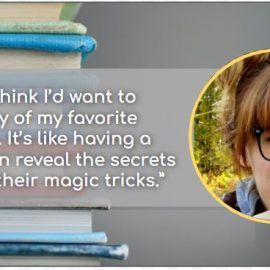
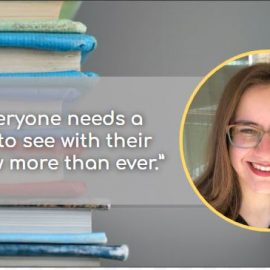
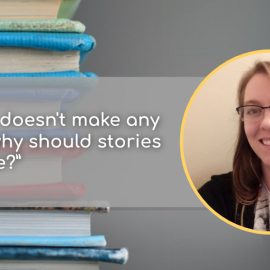
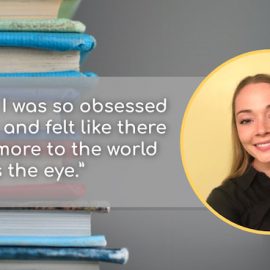

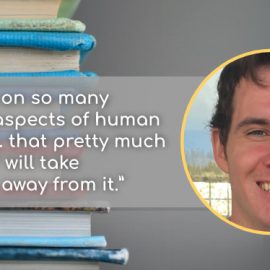
The Bible is my favorite book because it can be much more than a good read; it can be a personal conversation with the ultimate Author.